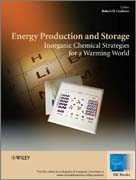
Energy production and storage: inorganic chemical strategies for a warming world
Crabtree, Robert H.
Energy production and storage are central problems for our time. In principle, abundant energy is available from the sun to run the earth in a sustainable way. Solar energy can be directly harnessed by agricultural and photovoltaic means, but the sheer scale of the energy demand poses severe challenges, for example any major competition between biomass production and food production would simply transfer scarcity from energy to food. Indirect use of solar energy in the form of wind looks also promising, especially for those regions not blessed with abundant sunlight. Other modes such as tidal and wave energy may well become important niche players. Inorganic chemistry plays a decisive role inthe development of new energy technologies and this Volume covers some promising modes of alternative energy production and storage that minimize the atmospheric burden of fossil-derived carbon monoxide. No one production or storage mode is likely to dominate, at least at first, and numerous possibilities needto be explored to compare their technical feasibility and economics. This provides the context for a broad exploration of novel ideas that we are likely tosee in future years as the field expands. This Volume covers a wide range of topics, such as: - Water splitting, only water is a sufficiently cheap and abundant electron source for global exploitation; - Energy conversion by photosynthesis; - Molecular catalysts for water splitting; - Thermochemical water splitting; - Photocatalytic hydrogen production; - Artificial photosynthesis, progress of the Swedish Consortium; - Hydrogen economy; - Reduction of carbon dioxide to useful fuels; - Conversion of methane to methanol; - Dye sensitized solar cells; - Photoinitiated electron transfer in fuel cells; - Proton exchange membranes for fuel cells; - Intermediate temperature solid oxide fuel cells; -Direct Ethanol fuel cells; - Molecular catalysis for fuel cells; - Enzymes and microbes in fuel cells; - Li-Ion batteries; - Magic Angle Spinning NMR studies of battery materials; Supercapacitors and electrode materials. About EIC Books The Encyclopedia of Inorganic Chemistry (EIC) has proved to be one of the defining standards in inorganic chemistry, and most chemistry libraries aroundthe world have access either to the first or second print edition, or to the online version. Many readers, however, prefer to have more concise thematic volumes, targeted to their specific area of interest. This feedback from EIC readers has encouraged the Editors to plan a series of EIC Books, focusing on topics of current interest. They will appear on a regular basis, and will featureleading scholars in their fields. Like the Encyclopedia, EIC Books aim to provide both the starting research student and the confirmed research worker witha critical distillation of the leading concepts in inorganic and bioinorganicchemistry, and provide a structured entry into the fields covered INDICE: Contributors. Series Preface. Volume Preface. PART 1: ENERGY PRODUCTION. H2 Production from Renewables (Rufino M. Navarro, M. Cruz Sanchez-Sanchez, M. Consuelo Alvarez-Galvan, Jose Luis G. Fierro and Saeed M. Al-Zaharani).Energy Conversion in Photosynthesis (Gozde Ulas and Gary W. Brudvig). Molecular Catalysts for Oxygen Production from Water (Antoni Llobet and Sophie Romain). Dye-Sensitized Solar Cells: an Overview (Luisa Andrade, Helena Aguilar Ribeiro and Adelio Mendes). Enzymes and Microbes for Energy Production by Fuel Cells (Frederic Barriere). Proton Exchange Membranes for Fuel Cells (Ram Devanathan). Methane-to-Methanol Conversion (Brian G. Hashiguchi, Claas H. H¨ovelmann,Steven M. Bischof, Kapil S. Lokare, Chin Hin Leung and Roy A. Periana). Photocatalytic Hydrogen Production from Water (Shamindri M. Arachchige and Karen J.Brewer). Intermediate-Temperature Solid Oxide Fuel Cells (Alan Atkinson, JohnKilner, Stephen Skinner, Nigel P. Brandon and Dan J. L. Brett). Some Computational Challenges in Energy Research (Victor S. Batista). Toward Solar Fuels Using a Biomimetic Approach: Progress in the Swedish Consortium for Artificial Photosynthesis (Sascha Ott, Stenbj¨orn Styring, Leif Hammarstr¨om and Olof Johansson). Direct Ethanol Fuel Cells (Zhi Wen Chia and Jim Yang Lee). Molecular Catalysis for Fuel Cells (Kenichi Oyaizu). Recent Advances in Photo-Initiated Electron-Transfer at the Interface between Anatase TiO2 Nanocrystallites and Transition-Metal Polypyridyl Compounds (Shane Ardo and Gerald J. Meyer). Electrochemical and Photoelectrochemical Conversion of CO2 to Alcohols (Robert H. Crabtree). PART 2: ENERGY STORAGE. Hydrogen Economy (Stephen A. Wells, Asel Sartbaeva, Vladimir L. Kuznetsov and Peter P. Edwards). Thermal Stability of Lithium Ion Battery Electrolytes (Brett L. Lucht, Tippawan Markmaitree and Li Yang).Supercapacitors: Electrode Materials Aspects (Li Li Zhang, Zhibin Lei, JintaoZhang, Xiaoning Tian and Xiu Song Zhao). Thermochemical Water-Splitting (Ali T-Raissi). Lithium Ion Batteries for Transportation and Electrical Energy Storage Applications: Nuclear Magnetic Resonance Studies of Structure and Function(Jordi Cabana and Clare P. Grey). Index.
- ISBN: 978-0-470-74986-9
- Editorial: John Wiley & Sons
- Encuadernacion: Cartoné
- Páginas: 426
- Fecha Publicación: 24/09/2010
- Nº Volúmenes: 1
- Idioma: Inglés
